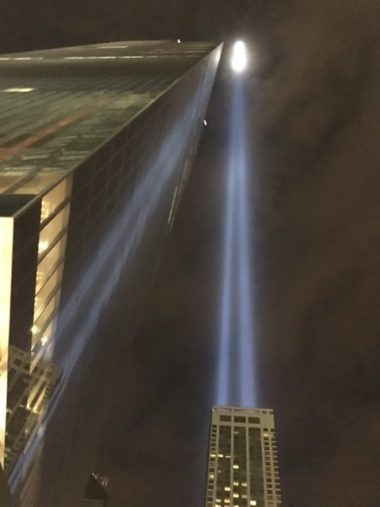 With each 9/11 anniversary, I still don’t know how to process the experience.
With each 9/11 anniversary, I still don’t know how to process the experience.
Of course, I was glad on Sunday’s 15th anniversary of 9/11 that the new World Trade Center is up and in what has become one of the most vibrant, architecturally advanced sections of Manhattan. I was happy about my photographic accident to the left, which had the emblematic twin columns of light, which appear every 9/11, reflecting off an adjacent building in ways that made me feel somehow protected by the heavens.
But the idea of airplanes crashing into large buildings is still unthinkable. I ran into a guy on Sunday who narrowly escaped, and described the sound of the aircraft hitting the buildings as thunder, and the loudest he had ever heard. Soon after, he relapsed on alcohol and drugs. The way we now live is increasingly unthinkable, with the daily news over the summer carrying accounts of one mass-killing disaster after another. What do you do with that?
One answer was to be had at the the Lower East Side venue known as The Spectrum. a tiny, living-room like place that’s inconspicuously located on the second floor at 121 Ludlow St. The curatorial style feels unmediated by the mainstream, that week having been devoted to the music of Michael Hersch, one of the most uncompromising voices out there. Yet to come is the New Complexity British Invasion Oct. 7-13 with music by such forbidding figures as Finnissy and McBride whose pieces are at the outer edges of the constructive powers of the human mind.
Back to Hersch.
His festival ended on Sept. 11 with his three-hour, 50-movement piano work The Vanishing Pavilions – a piece I’ve known for years without realizing that it was begun only days after Sept. 11. Now, some 15 years after its completion the piece emerged in much sharper relief in a performance by one of the few pianists (besides Hersch) with the time and ability to learn it – Jacob Rhodebeck, whose view was distinctly different from the composer’s. The point of reference in Hersch’s own performances seems to be works such as Messiaen’s Vingt Regards Sur l’Enfant-Jesus, both on record and at the world premiere in Philadelphia (which I heard). Rodebeck’s astoundingly performance – he’s a huge talent – gave the high-def version that in some ways showed great the music is.
The piece begins with musical catastrophes that build on themselves that seem to say, just when whatever is happening can’t get any worse, it does. But before one starts referencing the infamously complex Opus clavicembalisticum by Sorabji, one must point out that Hersch’s 50 movements are a meticulously constructed series complex poetic responses to the words of Christopher Middleton. Phrases like “explosions of clocks and winds without routine” are subtitles to movements. Hersch responded with a musical fragment of his own that also opens poetic doors leading somewhere significant, but in a constant state of questioning.
There’s no resolution. New enigmas arrive, but the minute they establish themselves, enter a state of metamorphosis. It’s not complex or obscure to the attentive ear. The music is about living with questions, finding equilibrium within constant uncertainty. The piece so refuses to manage your responses. It simply says here I am, make of it what you will since the route to equilibrium is one can only forge oneself.
The New York Times review by Corinna da Fonseca-Wollheim rightly compared the many-movement cycle to Bach and Liszt. She has a special talent for wrapping her head around works that others might find bewildering, and the comparison was apt with the piece’s constant counterpoint and sharp contours of the performance. More important was Rodebeck’s control of the piano’s resonance, which created a kind of spaciousness that allows the music to expand even more without taxing its train of thought.
The Vanishing Pavilions is a surprisingly elegant work. You may not know what every gesture means, but there’s strong intent behind it. And in way, Rodebeck’s performance was more demanding than Hersch’s because so much more musical information was hitting you at once. And in such a small venue – as opposed to the church where Hersch premiered it – you felt yourself veering into perceptual overload, when your brain starts rejecting incoming stimulus. But the piece would not allow that to happen. It seems to keep saying “No! There’s more! There’s always more! Whether you want it or not!”
The Spectrum offered bread and cheese at intermission. What I really needed was an emotional support animal.


My one experience of Michael Hersh’s music live was his piano concerto some years ago. I have to admit that it didn’t impress me, as it seemed to circle around the same dissonant arpeggios over and over again. Sort of like Harrison Birtwistle, after a fashion, except that Birtwistle has that style down more. The physical impact that you describe in this performance of ‘The Vanishing Pavilions’ does sound pretty impressive in a tight space.